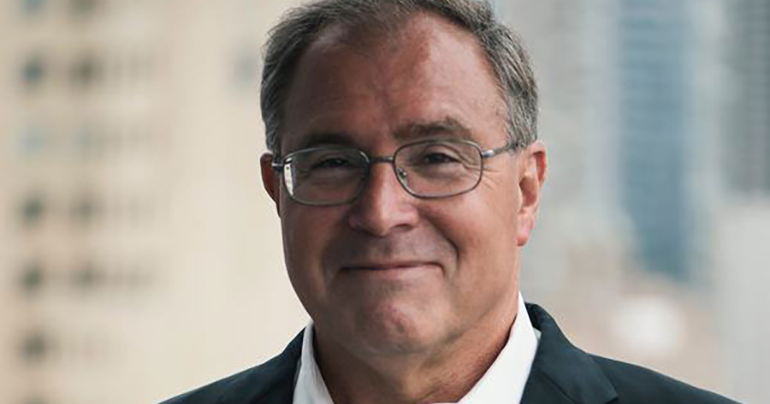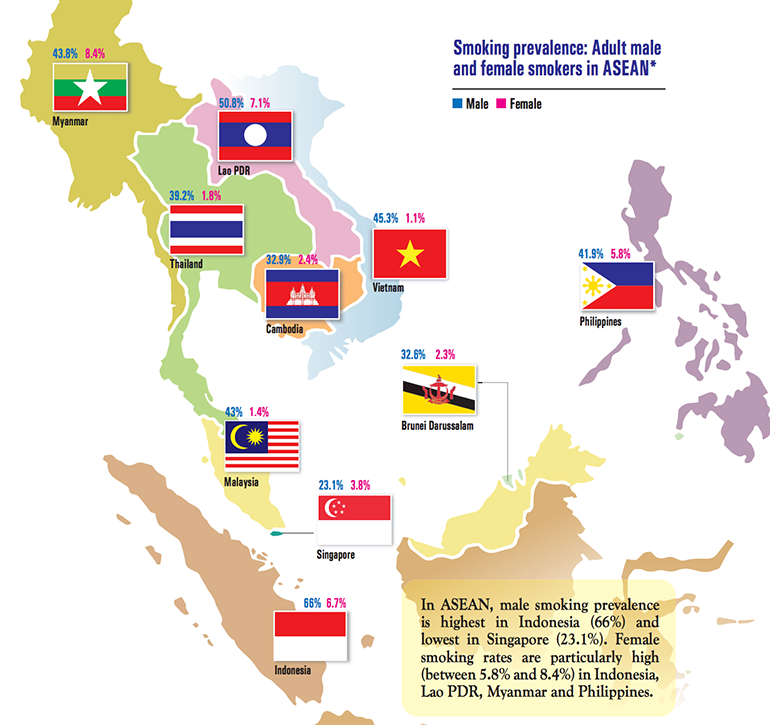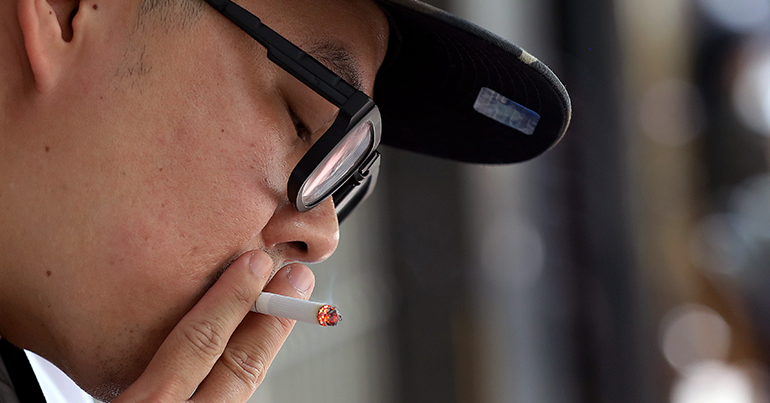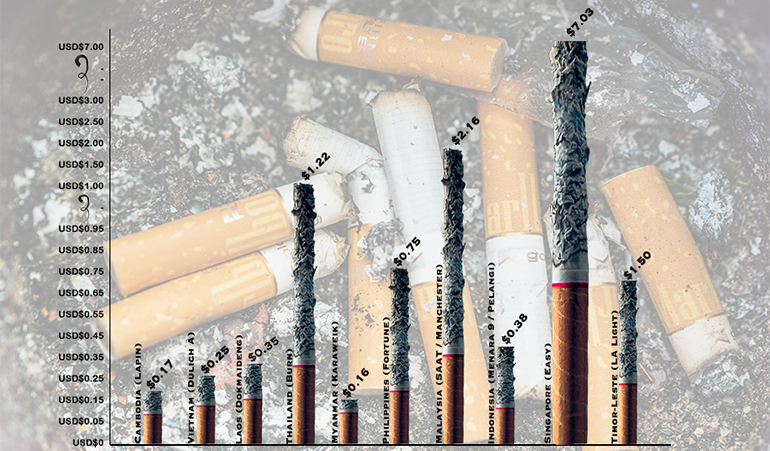It sounds like a mockery. Anyone currently visiting the Philip Morris International website will read there that the richest and most powerful tobacco company in the world wants to sell fewer cigarettes in the future and would rather not sell any at all sooner rather than later.
After decades in the business of nicotine addiction, in which the company ruthlessly trampled over millions of corpses, Philip Morris is purged: “Society expects us to act responsibly,” it says. “That’s what we do by creating a smoke-free future.”
André Calantzopoulos, CEO, leads by example. He has given up smoking and recommends that his customers do the same. What’s more, Calantzopoulos has decided to promote non-smoking.
The tobacco manager has promised almost a billion dollars to a new foundation, payable in 12 annual instalments of $80 billion each. From New York, the Foundation for a Smoke-Free World is to take action against cigarette smoke on earth – not with anti-advertising, but with research, including better methods of smoking cessation. No other organisation has anywhere near as much money to distribute in this field.
How can that work together: a tobacco company at the forefront of non-smoking activism? Is this just another cynical game? If you take a closer look, you will see that history becomes more bizarre with every turn.

Manhattan, a conference room at Rockefeller Center, 11th floor. Derek Yach, 62, an epidemiologist from South Africa, prepares himself for an interview. He is the founder and designated president of the foundation. He proudly announces his goal of “speeding up the end of smoking”, “eliminating cigarettes”, “everywhere”.
“The first research grants will be awarded as early as March 2018,” he says. He says he currently has five employees, but wants the number to grow to 30 before the fight really begins. He has lost two aunts and an uncle to cigarettes. His mother, 87, still smokes. He tried everything to dissuade her from continuing, even learning acupuncture in Hong Kong to use it on her. Without success.
It would be easy to dismiss the tobacco-financed anti-tobacco foundation as a new feint of the tobacco lobby if it weren’t for Derek Yach’s unusual biography. Perhaps no one has more merit for not smoking than he does: As executive director of the World Health Organisation (WHO), Yach was instrumental in driving the 2003 Framework Convention on Tobacco Control forward. It was the most severe blow the tobacco industry has ever suffered.
With it, the WHO has sworn to fight smoking and at the same time set the direction – higher taxes on tobacco, drastic warnings, advertising bans and consumption restrictions in public. Most non-smoker protection laws in Western countries contain a good piece of “Yaching”.
They are in the process of separating what kills from what is addictive. This is a fundamental change
And this man of all people now sits enthroned on a mountain of tobacco money and shakes hands with someone like Calantzopoulos, who is considered the head villain in the anti-tobacco fighter scene. It’s as if James Bond fought for the Mafia. What kind of devil has taken possession of him?
Yach used to warn against people like himself: in 2001 he appealed to researchers not to let themselves be bought over by tobacco companies. “Academic naivety about their true intentions is no longer excusable,” he wrote. And now Yach sits in the lion’s den, well-equipped and weighed. “This time”, he assures us, “it’s different”.
He puts on his tank cracker face. “I haven’t changed”, says Yach, “the tobacco industry has changed”. The industry now knows that the classic cigarette is being phased out in many parts of the world. It is simply too dangerous because it kills more than one in two of its long-time users; every year it kills more than seven million people.
To avoid further declines in sales and government bans, all tobacco companies are therefore investing many billions in nicotine products that are said to be less harmful, such as e-cigarettes. “They are in the process of separating what kills from what is addictive,” says Yach. “This is a fundamental change.”

If the successors of the cigarette were to establish themselves on the market, the number of nicotine addicts would remain high – but the number of deaths would “fall faster than ever before”. Yach speaks with trembling enthusiasm in his voice. For him it is beyond question that the new products, although not yet fully researched, mean “a 90 to 95% reduction in risk”, “perhaps more”. This perspective made it possible for him to do “the unthinkable”, namely to ally himself with Calantzopoulos.
Philip Morris could hardly have found a better PR man – or a more chic trophy. The company gets all this for free: what it transfers to the foundation every year is equivalent to about 1% of its profits. The allegedly transformed company still spends thousands of times more on smoking than it does on efforts to curb smoking.
The origin of the money apparently doesn’t give Yach any sleepless nights. His foundation is legally, personally and scientifically “absolutely independent of Philip Morris”. The statutes, he says, which have been examined by many international lawyers, prevent “any influence” on the part of the company. He would not be able to stop or change any research programme, he has no seat on the board, no right of veto, he could not cancel or reduce the contractually promised money, he says. The data of all studies paid for by the Foundation would be published in full, accessible to everyone; and of course, studies that were critical of Philip Morris would also appear, says Yach.
He wants to have three topics investigated as a matter of urgency with the company’s money: How can tobacco farmers be prepared for a future in which there is less demand for tobacco? How can research into smoking cessation be stimulated, where according to Yach there is “incredibly little progress”? And what is the real risk profile of the cigarette of the future, whether from Philip Morris or other manufacturers?
“We need large-scale studies,” says Yach, “that show exactly what happens in the body after six months of use, what happens after 12 months, what happens after 18 months. The knowledge about the long-term risks of the new products had to be accumulated much faster than in the case of the modern cigarette invented in 1913 – it had taken another 50 years for independent physicians to realise that it had a strong carcinogenic effect.

It seems that Philip Morris is confident that its products will perform well in such tests. The group’s most important new product is called Iqos. It was developed in a glass palace in Neuchâtel, Switzerland, where over 400 researchers, many of them from the pharmaceutical and biochemical industries, are looking for less lethal technologies to flood smokers’ brains with nicotine.
A massive advertising campaign for Iqos is currently underway in numerous German cities, and classic cigarette advertising has disappeared for the most part. According to Philip Morris, more than 3.7 million people worldwide have already switched to Iqos.
In the USA, the FDA is currently reviewing a marketing authorisation application from the Group. Philip Morris submitted two million pages of material. Now it hopes to be able to market its newcomer with an official blessing as a less dangerous alternative to cigarettes. Analysts are already predicting explosive growth for him in this case.
Iqos is a lightweight plastic stick with a built-in battery. Unlike the similar-looking e-cigarettes, where only a nicotine-containing liquid is vaporised, real tobacco is used here. This is heated with electricity to around 350°C and thus reaches less than half the temperature of a conventional cigarette.
According to Philip Morris, this process produces “more than 90% less toxins” because the tobacco does not burn. In such heat-not-burn products there is neither fire nor ash, nor does the unpleasant smell remain in the user’s mouth. For smokers, Iqos is nevertheless more attractive than an e-cigarette, because an aerosol containing nicotine is formed in Iqos, which feels like the usual smoke.
How much of this is true is unclear for the time being. Independent studies are still rare. Five Swiss researchers recently published a first study in the journal “Jama”. Their result: even in the Iqos-Qualm, they were able to detect in the laboratory some of the dangerous substances that are produced when heated to high temperatures.
Although many chemicals are present in the Iqos vapours in a moderately to greatly reduced form, this does not mean that they are therefore harmless to health. In Iqos the scientists found 84% of nicotine, 74% of formaldehyde and 295% of Acenaphtens of a typical cigarette.

The result of the Swiss researchers is devastating: Philip Morris misled the audience by claiming that Iqos does not produce smoke. It is smoke that is only called differently.
Scientists from the tobacco company responded with a replica in “Jama” and accused their colleagues of an incorrect methodology. Yach says he didn’t read the study and can’t comment on it.
But Yach admits: “Iqos is an early product.” Even better variants are under development. What is currently happening in the research laboratories of tobacco companies, where billions and billions are being spent on the cigarettes of the future, is “beyond anything we could have imagined at the WHO 20 years ago”. Just as the driverless electric car is turning the car industry upside down, the new nicotine consumption devices are whirling the tobacco industry and the anti-tobacco movement around. “A mantra used to apply to us: demonise the manufacturers; isolate them; forbid them from marketing,” says Yach.
And now? Obviously, in times when the industry is striving for harm reduction, the tone is changing towards harm reduction. “I think state regulation must be proportional to risk,” says Yach. “If the risk is high, taxes should rise and marketing should be restricted.”
Conversely, this means a free hand for tobacco companies that only make their customers addicted but don’t kill as many people anymore.
A demonstrably less harmful nicotine spin could become a less regulated miracle product for companies, allowing them to reclaim lost territory among non- and ex-smokers, perhaps even in gastronomy and at work, just as before. From the manufacturers’ point of view, the future of smoking also lies in nicotine-containing non-smoking – and that’s why the billion euro endowment for Yach is not a donation, but an investment.
Smoking kills more people every year than murder, AIDS, suicide, drugs, car accidents and alcohol combined
Is Yach naive, then? Is he stupid to believe that this time everything is different? Companies have often promised healthier cigarettes. But they have never delivered them. At one time the filter was supposed to be the miracle solution, another time it was the alleged “light cigarette”, of which the companies knew for certain that it was by no means a less risky product.
In 1997, the then Philip Morris CEO Geoffrey Bible claimed in court and under oath that of course he would “immediately close down” his factories if a link between smoking and lung cancer could be proven. In truth, researchers from tobacco companies had already recognised this connection in the 1950s and kept it a secret from the outside world.
No other industry has historically lied, hushed up and denied so much – no other has better earned deep mistrust. The companies have always manipulated the cigarette in such a way that it has a maximum addictive effect. They are likely to do the same again with the cigarette 2.0, because nothing benefits profit as well as customers who no longer have any choice as to whether they use a product.
In view of the industry’s practices, a US federal judge lost patience a good 11 years ago. She condemned the companies to publicly correct their countless false allegations. For a long time the companies let their lawyers fight against it, but at the end of November 2017 they had to place the first of a whole series of anti-advertisements in their name in the US daily press. “Smoking kills an average of 1200 Americans a day,” they read. “Smoking kills more people every year than murder, AIDS, suicide, drugs, car accidents and alcohol combined.”

When Yach announced whose money was in his foundation, an outcry went through the ranks of anti-tobacco fighters. Important medical societies, including the World Heart Federation and the American Cancer Society, distanced themselves from him. Yach’s new partner seemed too dubious to them, which would not lead to less addiction and better health in the end, but at best to higher profits for Philip Morris.
The editors of the trade journal Tobacco Control announced that they would not publish a single study financed from Yach’s pot. The acceptance of tobacco money is considered a mortal sin. The British Lancet warned Yach in an editorial that he was inflicting serious damage on his reputation; the establishment of the foundation was perhaps the biggest mistake in the history of the fight against tobacco companies.
And the WHO itself officially called on governments, researchers and health organisations to boycott its ex-director and his Foundation for a Smoke-Free World. The architect of the Framework Convention on Tobacco is suspected of undermining this very convention.
Yach could hardly have made a more miserable start. Philip Morris should nevertheless be satisfied. It was always good for the company when the front of the tobacco opponents broke out in a quarrel.
Yach himself is capable of amazing flexibility. After the fight against tobacco, he led the WHO’s campaign against lemonade manufacturers, who are considered complicit in the obesity pandemic. He pressed the companies in the usual manner – before he surprisingly changed sides in 2007: Yach was hired as Senior Vice President at PepsiCo, the company that had just been his opponent.
This was Yach’s first trip into a lion’s den. From the inside he tried to persuade the beverage and snack company to produce healthier products, less sugar, less salt and less fat. When he left the group in 2013, he estimated that he was “65% successful”. After all, PepsiCo now also offers a number of risk-reduced products because of him.
Stanton Glantz, a leading tobacco critic from the University of California in San Francisco, says it is only logical that this man should now lead a foundation full of tobacco millions. “Derek Yach’s journey to the dark side is now complete.”
This article was published on Spiegel Online on 5 December 2017


